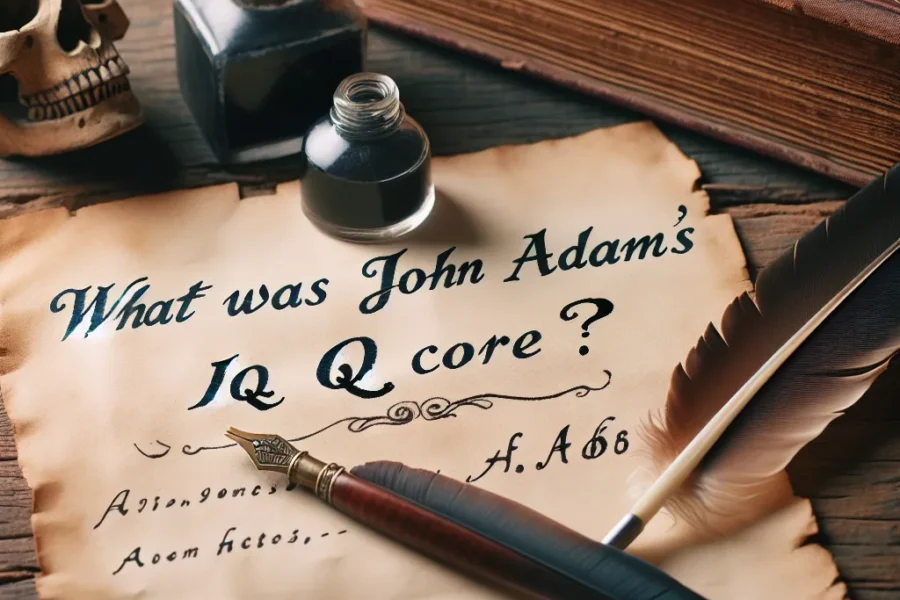In the annals of American history, few figures are as captivating and enigmatic as Thomas Jefferson. A polymath, political philosopher, plantation owner, and the principal author of the Declaration of Independence, Jefferson’s life and legacy have been the subject of extensive study and debate. One curious topic that often emerges is the question: What was Thomas Jefferson’s IQ score?
If you are looking for legitimate IQ Tests which pass the entry bar for Mensa, see our IQ Tests.
To be clear, Thomas Jefferson lived in the 18th and early 19th centuries, a time long before IQ tests were conceived. The concept of a standardized measure of intelligence didn’t come into existence until the early 20th century, with the development of the Binet-Simon test by Alfred Binet and Théodore Simon in 1905. The American psychologist Lewis Terman later adapted this test into what is known today as the Stanford-Binet Intelligence Scale, the cornerstone of modern IQ testing.
Given that Jefferson never took an IQ test, any estimate of his IQ is speculative. These estimates typically stem from analyses of his writings, achievements, and the accounts of his contemporaries. Jefferson was undeniably an intellectual giant, but quantifying his intelligence with a score derived from a later era’s testing standards can be problematic.
Thomas Jefferson was born on April 13, 1743, in Shadwell, Virginia. The son of a planter and surveyor, Jefferson had the benefit of a privileged education, attending the College of William & Mary where he studied a broad range of subjects, including philosophy, mathematics, and law. His appetite for knowledge was insatiable, and he reportedly studied 15 hours a day during his college years. This zeal for learning was a lifelong trait, reflected in his expansive personal library, which served as the foundation for the Library of Congress after it burned down in 1814.
Jefferson’s intellectual pursuits were not limited to formal education. He was skilled in a diverse array of disciplines, including architecture, agriculture, linguistics, and natural sciences. He designed his own home, Monticello, incorporating Classical Greek and Roman elements that emphasized symmetry and geometry. His Notes on the State of Virginia reveal an acute observational acumen and a deep understanding of the natural world, with detailed descriptions of the state’s geography, flora, and fauna.
Politically, Jefferson’s prowess was equally profound. As a key architect of American democracy, his influence can be seen in the Declaration of Independence, where he eloquently articulated the principles of individual liberty and government by consent. Later, as the third President of the United States, Jefferson oversaw significant events such as the Louisiana Purchase and the Lewis and Clark Expedition, which significantly expanded the nation’s territory and knowledge of the American West.
The sheer breadth of his knowledge and achievements often leads scholars and enthusiasts to speculate about the nature of his intelligence. Some have attempted to retroactively apply modern IQ scoring to historical figures like Jefferson. Estimates of his IQ have ranged significantly, with some placing it as high as 160, which would qualify as “genius” status by contemporary standards. However, these estimates are highly conjectural and should be taken with a grain of caution.
Modern attempts to estimate Jefferson’s IQ often rely on a method known as historiometry, which involves analyzing biographical information to infer cognitive abilities. The method was popularized by psychologist Catharine Cox in her 1926 study “The Early Mental Traits of Three Hundred Geniuses.” In this study, Cox retroactively estimated the IQs of several historical figures, including Jefferson, by examining their childhood intelligence, level of education, and accomplished works. Cox concluded that Jefferson’s IQ likely fell within the range of 155 to 160, placing him in the upper echelons of human intellect.
However, historiometry is an imprecise science. It’s akin to trying to measure liquid with a sieve. Intelligence is multifaceted and context-dependent, making it challenging to distill into a single number, especially posthumously. Jefferson’s accomplishments—while undoubtedly impressive—were aided by his social standing, access to extensive resources, and the specific historical moment in which he lived. These factors complicate straightforward comparisons to modern individuals who have taken standardized IQ tests.
Furthermore, the very notion of IQ itself is a subject of ongoing scientific debate. While IQ tests measure certain cognitive abilities, they do not capture the full complexity of human intelligence. Cognitive scientists recognize multiple forms of intelligence, such as emotional intelligence, creative intelligence, and practical intelligence, which traditional IQ tests may not adequately assess. Someone like Jefferson, with his diverse talents and achievements, likely excelled in multiple forms of intelligence, further complicating any effort to assign him a singular IQ score.
Additionally, Jefferson’s intellectual life was not without its paradoxes and inconsistencies. His advocacy for liberty and democracy coexisted with his status as a slave-owner, a contradiction that has led to extensive scrutiny and criticism. Jefferson’s views on race and slavery are particularly controversial and often cited as a testament to the complex and conflicting nature of human intelligence. His writings reveal deeply held prejudices, yet he also penned one of the most consequential affirmations of human equality in the Declaration of Independence. This cognitive dissonance is a stark reminder that high intelligence does not necessarily equate to moral clarity or consistency.
In popular culture, the fixation on IQ can sometimes overshadow more nuanced understandings of intelligence. Figures like Jefferson are fascinating not merely because of their raw intellectual capabilities but because of how they applied their intelligence in transformative ways. Jefferson’s lasting legacy is a testament to his ability to synthesize diverse fields of knowledge, articulate compelling visions, and implement impactful policies. His intellectual versatility and contributions to multiple domains exemplify a holistic intelligence that transcends simple quantification.
In conclusion, while it’s interesting to speculate about Thomas Jefferson’s hypothetical IQ score, such speculation can never yield a definitive answer. Jefferson’s intellectual legacy is better appreciated through the lens of his accomplishments and contributions to American society and the broader world. His life serves as a reminder of the multifaceted nature of intelligence and the many ways it can manifest. Rather than fixating on a numerical estimation that cannot be accurately determined, one might instead celebrate the breadth and depth of Jefferson’s intellectual endeavors, recognizing that his true genius lay in his unparalleled capacity for learning, innovation, and governance.



Leave a Comment